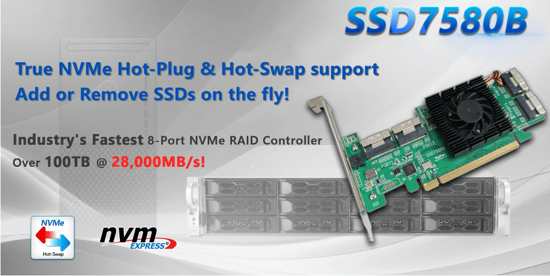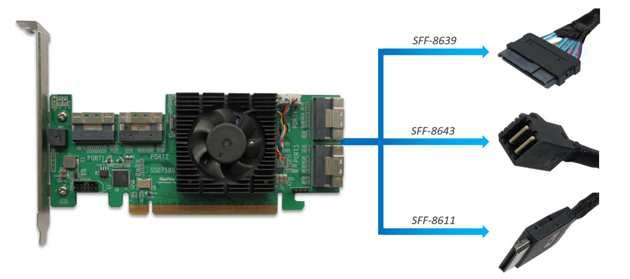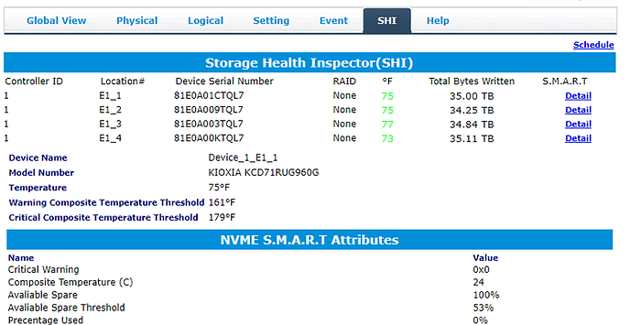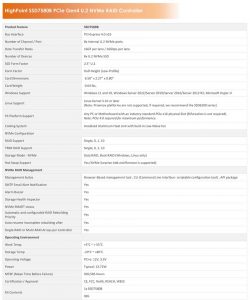HighPoint SSD7580B Fast NVMe RAID PCIe 4.0 x16 Controller With Hot-Swap and Hot-Plug Capability
$1,200, with 8 independent device channels capable of supporting over 100TB of hot-swappable, at speeds up to 28,000MB/s
This is a Press Release edited by StorageNewsletter.com on March 15, 2022 at 2:01 pmThe SSD7580B from HighPoint Technologies, Inc. is as fast single-card PCIe Gen4 NVMe RAID solution.
The dedicated PCIe 4.0 x16 host interface and 8 independent device channels are capable of supporting over 100TB of hot-swappable, at speeds up to 28,000MB/s!
The half-height form factor can be installed into nearly any industry standard PC-based server, workstation and rackmount platform running Windows- and Linux-based OSs.
Like other members of the SSD7500 series product family, the SSD7580B is equipped to tackle a range of high-performance applications including AI training and analysis, high-speed data acquisition and security solutions, scientific modeling and imaging systems, 3D rendering and design, and HD media production and editing platforms.
In addition, a selection of flexible cabling options is available for the SSD7580B, which enable the controller to host both RAID, non-RAID, and mixed configurations of U.2 or M.2 NVMe SSDs, via SFF8639, SFF-8643 and SFF-8611 backplanes.
Challenge: Field serviceability
One of NVMe technologies biggest hurdles is field serviceability. Physically upgrading, maintaining or replacing NVMe media can be a tedious and time-consuming process.
Though considerably slower than NVMe media, and far less reliable due to the number of moving parts, SAS-based HDD storage remains the solution of choice for many enterprise server applications. One major advantage SAS hardware has had over NVMe storage is the ability to add or replace drives on the fly without having to reboot or power down the host platform. Even basic, entry level non-RAID SAS controllers feature some level of hot-plug capability.
Conversely, most NVMe controllers in today’s marketplace offer no hot-swap or hot-plug features; in order to add replace an NVMe SSD, the host system has to be powered down. More recent solutions support hot-replacement; the ability to ‘add’ drives for specific tasks. For example, an unused NVMe SSD that is already connected to the controller, but in standby mode, could be used to rebuild an array in some situations. However, a reboot is still required – unlike the majority of SAS/SATA based solutions, the host OS will not recognize NVMe related hardware changes until the system has been restarted. That is, until now.
Solution: SSD7580B simplifies field service workflows with hot-swap and hot-plug capability.
SSD7580B controllers combine flexible serviceability of SAS/SATA solutions with performance and reliability of enterprise U.2 storage.
It is a game changer. Armed with 8 independent device ports, a dedicated PCIe 4.0 x16 host connectivity and powered by firm’s RAID technology, the SSD7580B is the fastest NVMe RAID controller in today’s public marketplace.
And unlike the majority of NVMe storage solutions, the SSD7580B’s hot-plug and hot-swap support works like you expect it to; it effectively eliminates the need to power down or reboot a system in order to add or remove NVMe SSDs.
The SSD7580’s hot-plug and hot-swap capability enable customers to add or remove one or more drives on the fly, as necessity demands. This includes RAID and single-drive configurations. The controller will notify the system of any changes in real time – no reboot required!
Flexible connectivity architecture:
The SSD7580B’s hot-plug capability works with a variety of industry standard connectors – not just SFF-8639, which is employed directly by U.2 media. The company offers a selection of PCIe Gen4 cabling accessories capable of supporting hot-swappable storage configurations, including SFF-8643 NVMe and SFF-8611 Oculink backplanes. This allows the SSD7580B to support any industry standard U.2 or M.2 NVMe SSD.
At 2.27″ tall and 6.5″ long, its compact single-width form factor enables it to be installed into a range of industry standard server, rackmount and workstation platforms.
Industry proven PCIe Gen4 NVMe RAID technology with boot capability
The SSD7580B NVMe RAID controllers is powered by firm’s PCIe Gen4 NVMe RAID stack, and is capable of supporting one or more RAID-0, -1 or -10 arrays, or mixed configurations of arrays and single disk SSDs. In addition, it can be configured to host bootable RAID arrays and single SSDs for Windows- and Linux-based platforms.
-
RAID-10 (security and speed) – RAID-10 requires a minimum of 4 NVMe SSD’s and is comprised of a stripe between two RAID-1 arrays. RAID-10 capable of delivering read performance on par with RAID-0, and is superior to RAID-5 for NVMe applications. Unlike RAID-5, RAID-10 doesn’t necessitate additional parity related write operations, which reduce the TBW life span of NVMe SSD’s.
-
RAID-0 (speed) – Also known as a ‘stripe’ array, this mode delivers maximum performance, and requires a minimum of 2 NVMe SSD’s.
-
RAID-1 (security) – This mode creates a hidden duplicate of the target SSD, and requires 2 NVMe SSDs to configure.
Management and monitoring suite simplifies fieldwork and maintenance workflows – from initial setup through long-term maintenance
The company believes that you should not need a professional IT background to configure, monitor and maintain NVMe and RAID storage configurations. The SSD7580B includes a suite of graphical and command-line based management and monitoring tools for administrators of any experience level.
-
WebGUI is a simple GUI designed to work with all modern Web browsers. It is equipped with Wizard-like quick configuration menus as well as a suite of tools for expert administrators.
-
CLI (Command Line Interface) is for seasoned administrators or platforms that do not utilize graphical Oss.
The WebGUI’s SHI Feature (Storage Health Inspector) allows administrators to instantly check the operating status of storage devices in real-time. SHI utilizes SMART technology to log and report the physical characteristics of each NVMe SSD, such as temperature, voltage and TBW (Total Bytes Written).
TBW tracking, in particular, is essential for maintaining the long-term health of NVMe storage configurations. NVMe media have finite write capability; once the TBW threshold has been reached, the NVMe SSD should be replaced to avoid the risk of a write failure. SHI combined with native hot-swap capability enables administrators to replace NVMe media on the fly, without having to power down or reboot the host platform.
Online Array Roaming – The SSD7580B’s Online Array Roaming capability simplifies upgrade and replacement procedures, as customers can migrate SSDs from one controller to another, without having to start from scratch or recover an array. The controller is also capable of recognizing arrays created with other SSD7000 and SSD7500 series controllers, even if the SSDs are moved to different ports.
Intelligent 1-Click self-diagnostic solution: The firm’s Web-based graphical management suite (WebGUI) now includes a host of automated diagnostic tools designed to streamline the troubleshooting process, even for novice administrators. Customers no longer have to manually assemble a collection of screenshots, logs and status reports when submitting support inquiries. One-click enables the interface to gather all necessary hardware, software and storage configuration data and compile it into a single file, which can be transmitted directly to company’s FAE team via its online support portal.
The SSD7580B is set to launch towards the middle of March 2022, and will be available direct from the company’s Estore, and official North American distribution and retail partners. SSD7580B – 8-port PCIe 4.0 M.2/U.2 drive controller: MSRP $1,199.
Resources:
Video: HighPoint – Introducing the SSD7580B – Industry’s Fastest 8-Port NVMe RAID Controller
Video: HighPoint – SSD7580B – Hot-Swap feature
Video: HighPoint SSD7580B – Introducing Online Array Roaming

















 Subscribe to our free daily newsletter
Subscribe to our free daily newsletter
